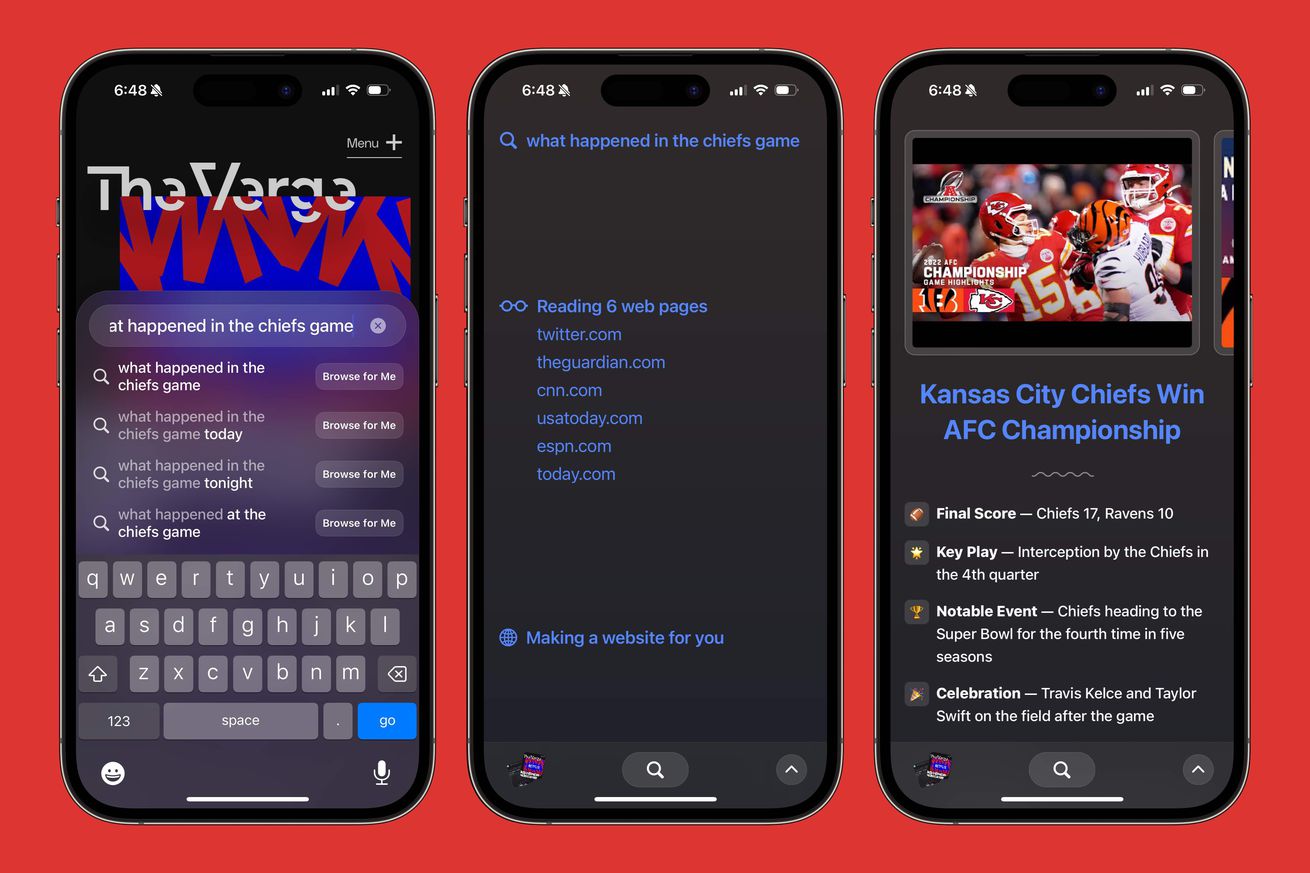Arc Search combines browser, search engine, and AI into something new and different

Arc Search combines browser, search engine, and AI into something new and different

A few minutes ago, I opened the new Arc Search app and typed, “What happened in the Chiefs game.” That game, the AFC Championship, had just wrapped up. Normally, I’d Google it, click on a few links, and read about the game that way. But in Arc Search, I typed the query and tapped the “Browse for me” button instead.
Arc Search, the new iOS app from The Browser Company, which has been working on a browser called Arc for the last few years, went to work. It scoured the web — reading six pages, it told me, from Twitter to The Guardian to USA Today — and returned a bunch of information a few seconds later. I got the headline: Chiefs win. I got the final score, the key play, a “notable event” that also just said the Chiefs won, a note about Travis Kelce and Taylor Swift, a bunch of related links, and some more bullet points about the game.
Basically, instead of returning a bunch of search queries about the Chiefs game, Arc Search built me a webpage about it. And somewhere in there is The Browser Company’s big idea about the future of web browsers — that a browser, a search engine, an AI chatbot, and a website aren’t different things. They’re all just parts of an internet information finder, and they might as well exist inside the same app.
a little Sunday surprise for you…
meet @browsercompany‘s 2nd product:
Arc Search
it’s a default browser for your iPhone
…that BROWSES FOR YOUthe origin story is a bit unusual so I wanted to give you the full backstory: pic.twitter.com/pkVQJYN0QQ
— Josh Miller (@joshm) January 28, 2024
Arc Search is part of a bigger shift for the Arc browser, too. The company’s mobile app has until now been mostly a companion app to the desktop, a way to access your open tabs and not much else. With Arc starting to roll out to Windows users, The Browser Company is also getting ready to roll out its own cross-platform syncing system, called Arc Anywhere, and to bring some of these AI-powered features to Arc on other platforms. (Eventually, CEO Josh Miller says, Arc Search will just be called Arc and will be the company’s only mobile app.)
The “Browse for me” feature isn’t perfect, but it’s pretty impressive. When I search “What’s Pete Davidson up to,” for instance, it gives me some broad-strokes information about his recent film and breakup news (very useful!), links to his Wikipedia page, and a couple of news sites’ tag pages for Pete Davidson (meh), and then a bunch of information about his recent personal and professional goings-on. Like many AI tools, Arc Search isn’t great at citing its source, so I can’t completely trust that Davidson and Chase Sui Wonders actually broke up, but there is a “Dive Deeper” section at the bottom with a bunch of links. Most of those links are the same generic stuff, like a “Pete Davidson’s net worth” webpage that I’m confident isn’t right, but there’s good stuff here too.
The system has improved a lot even in the time I’ve been testing the app, and Miller says there’s plenty more room for Arc Search to get smarter. (The underlying AI models come from a mix of OpenAI and others.) Arc has been deeply invested in AI for a while, and some of its Arc Max features have been a hit with users. As the whole industry of generative AI tools improves, so will Arc.
I like Arc Search as a browser, too — it’s simple and fast and always opens to an empty search box, which feels right on mobile. But it does put The Browser Company in the middle of a lot of complicated AI discussions. Will the company work with the publishers whose information it’s using to populate these answers? How will Arc’s AI cite its sources? How personalized should these things be? How personalized can they be? A search like this is bound to be expensive; will Arc Search be a paid product over time? The company hasn’t shared much about its plans on these fronts yet, but there are a lot of questions to be answered.
But from a pure product perspective, this feels closer to the way AI search should work than anything I’ve tried. Products like Copilot and Perplexity.AI are cool, but they’re fundamentally just chatbots with web access. Arc Search imagines something else entirely: an AI that explores websites by building you a new one every time you ask.
Next week, millions of people will start typing the internet’s favorite phrase: “What time does the Super Bowl start.” I already know, because I clicked “Browse for me,” and I also now know where the game is, how to watch it, and to be sure and clear my schedule for Usher at halftime. That’s a pretty good search result.

